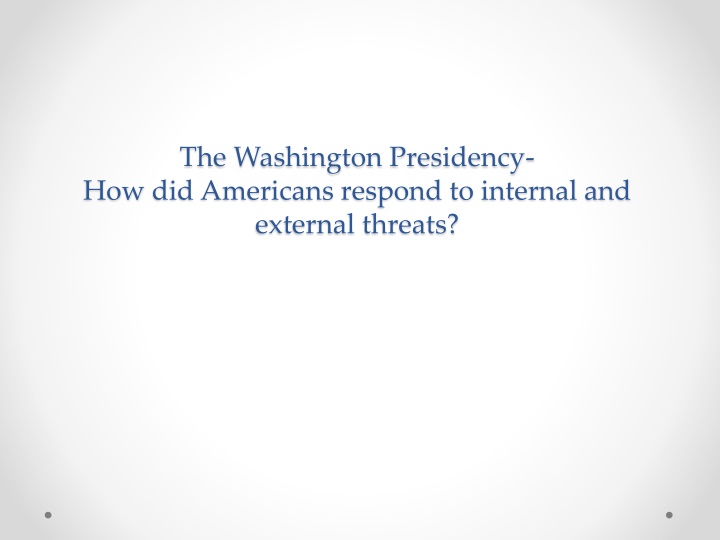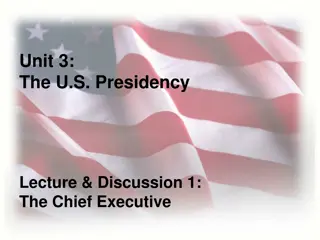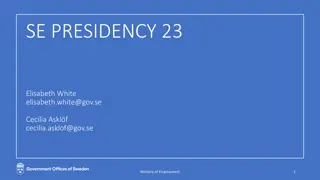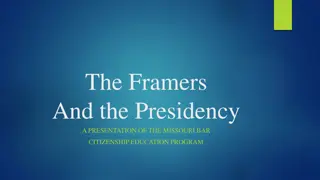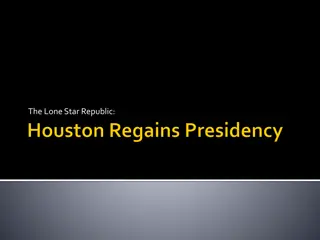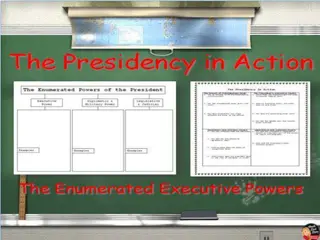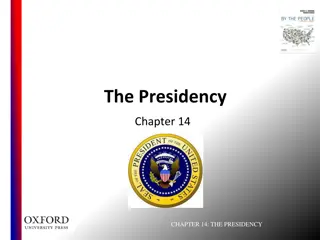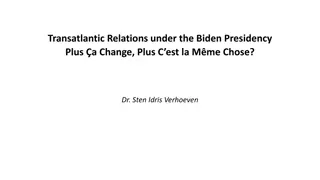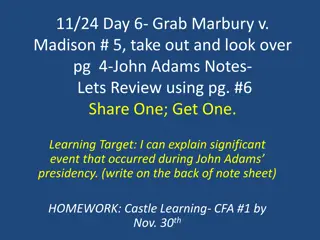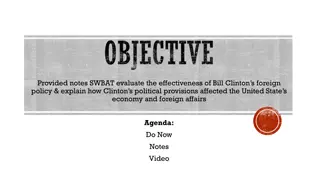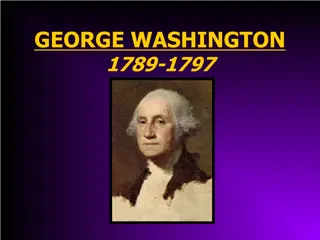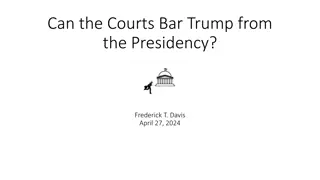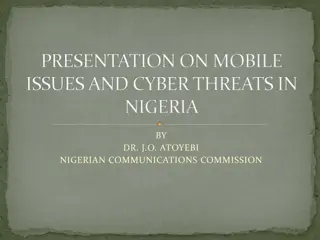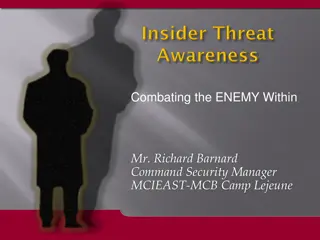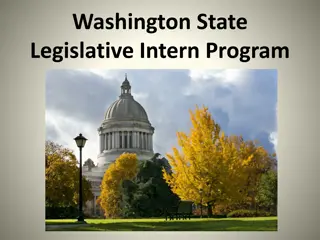Responding to Threats in the Washington Presidency
During George Washington's presidency, Americans faced internal and external threats, prompting responses such as the inauguration of Washington setting a presidential precedent, the organization of the federal government, economic crises post-Revolutionary War, and Alexander Hamilton's economic plan. These events tested the strength of the Constitution and laid the foundation for key policies and decisions in early American history.
Download Presentation

Please find below an Image/Link to download the presentation.
The content on the website is provided AS IS for your information and personal use only. It may not be sold, licensed, or shared on other websites without obtaining consent from the author.If you encounter any issues during the download, it is possible that the publisher has removed the file from their server.
You are allowed to download the files provided on this website for personal or commercial use, subject to the condition that they are used lawfully. All files are the property of their respective owners.
The content on the website is provided AS IS for your information and personal use only. It may not be sold, licensed, or shared on other websites without obtaining consent from the author.
E N D
Presentation Transcript
The Washington Presidency- How did Americans respond to internal and external threats?
Section 1- Washington Heads the New Government George Washington sworn in in inauguration ceremony on 4/30/1789. INAUGURATION- OFFICIAL SWEARING IN OF THE PRESIDENT. Washington knew he would set the precedent for the office of the president. o PRECEDENT- AN EXAMPLE TO BE FOLLOWED BY OTHERS IN THE FUTURE
Students will examine events of the early nation including Hamilton s economic plan, the Louisiana Purchase, the Supreme Court decision in Marbury v. Madison, and the War of 1812 in terms of testing the strength of the Constitution. Students will examine the Monroe Doctrine and its effects on foreign policy.
Federal Government in 1789 Only 75 post offices Only 672 soldiers in the military Only 6 Supreme Court Justices o John Jay appointed by Washington to be the first S.C. Chief Justice
Organizing the Executive Branch Set up the President s Cabinet: CABINET- PRESIDENT S ADVISORS o SECRETARY OF THE TREASURY- ALEXANDER HAMILTON o SECRETARY OF STATE- THOMAS JEFFERSON o Attorney General- Edmund Rudolph o Secretary of War- Henry Knox
Nations First Economic Crisis NATION WAS IN DEBT AFTER THE REVOLUTIONARY WAR WARS ARE EXTREMELY EXPENSIVE Most debt came from the sale of BONDS- CERTIFICATES FOR A CERTAIN AMOUNT OF MONEY THAT THE GOVERNMENT PROMISES TO PAY BACK AT A LATER TIME WITH INTEREST
Hamiltons Economic Plan ALEXANDER HAMILTON= SECRETARY OF THE TREASURY. JOB= ECONOMIC ADVISOR TO THE PRESIDENT. HELPS MAKE POLICIES TO HELP THE NATION S ECONOMY. 1. PAYING OFF THE DEBT- GOVERNMENT WOULD PAY OFF ALL FEDERAL AND STATE DEBTS TO ENCOURAGE TRUSTWORTHINESS AND FUTURE INVESTMENT. 1. Southerners opposed this plan because many of the Southern states had already paid off their war debts. 2. Compromise- Southerners agreed if the nation s capital was moved to the South Hence, why our capital is in Washington D.C.
Hamiltons Plan (cont.) 2. CHARTER A NATIONAL BANK- A PLACE WHERE THE GOVERNMENT COULD HOLD THEIR FUNDS. o A place to keep funds o A place to control the paper money supply o Jefferson opposed the bank saying that it was unconstitutional because nowhere in Article I, Section 8 did it state that the Federal Government could start their own bank. o Hamilton countered, saying that the elastic clause would allow the federal government to create the bank. o Congress passed and the President signed the bank into law in 1791.
Hamiltons Plan (cont.) 3. HIGH TARIFFS ON IMPORTS Tax on imported goods to protect prices of American made goods Make foreign goods more expensive in comparison o Southerners disapproved and the tariff was never passed. They thought that it would unfairly benefit the Northern manufacturers and hurt the Southerners by making them pay a higher price for goods.
Whiskey Rebellion (LB) 1791- CONGRESS PASSED A TAX ON ALL WHISKEY MADE AND SOLD IN THE U.S. o Called a Sin or an excise tax. Pennsylvania Farmers refused to pay the tax o Claimed it was just like Great Britain all over again Federal tax collectors demanded payment Farmers rebelled WASHINGTON SENT IN FEDERAL TROOPS TO ENFORCE THE LAW GW later pardoned the leaders of the rebellion THE EVENT REINFORCED THE POWER OF THE NEW GOVERNMENT.
Checkpoint Questions 1. How was the Constitution tested by Hamilton s economic plans? 2. Why did Southern states oppose the creation of a national bank 3. Why did Southern states opposed high tariffs? 4. What roles did Hamilton and Jefferson play in the new government? 5. What was the Whiskey Rebellion and how was it resolved? 6. How do you think Washington handled the Whiskey Rebellion?
6.2- Political Parties Emerge The Big Idea: Two distinctly different political parties started up as a result of Alexander Hamilton s economic plan. Federalists- supported Hamilton Republicans- opposed Hamilton s plan
Factions Political parties were originally called factions. This was a negative term that meant selfishness.
G. Washington on factions Hated them Caused members of his cabinet to grow apart and led his Secretary of State, Thomas Jefferson to resign Predicted that factions would destroy, the best fabric of human government and happiness.
Republicans versus Federalists
Election of 1796 Two main candidates: o John Adams- Federalist o Thomas Jefferson- Republican Adams wins and Jefferson becomes VP.
Answer this question in your notes:
8.3- Troubles at Home and Abroad Why it matters: o Political parties split Americans over domestic issues. o Americans would also differ over foreign policy
Domestic Problems Troubles in the Northwest Territory Inhabited by Native Americans British still had forts and a presence there. o Were selling guns and ammo to the Natives. Americans wanted to move into these lands to farm and for more land. PROBLEM! o It was property of the U.S. but Native Americans were living there. o What do you think happened??? (This will be a continuous them in US history)
Conflict: NW Territory US Government tries to buy the lands in the Northwest territory north of the Ohio River. Natives refuse to sell 1790- GW sends troops into the territory Easily defeated by Little Turtle and Blue Jacket GW sends more troops they are also defeated. 1794- GW sends General Mad Anthony Wayne. Defeats the Natives and the Battle of Fallen Timbers Results in the Greenville Treaty.
Greenville Treaty Natives forced to give up land from the Ohio River to Lake Erie
Trouble Abroad French Revolution o Inspired by the American Revolution o Goal was to overthrow the monarch and create a democratic government. o Americans initially supported the French. o Then, it turned VIOLENT (17,000 executions) o Federalists stopped supporting the French. o Anti-federalists continued to support the French. o President Washington said the US would remain neutral. o US businesses wanted to continue trading with both sides.
Trade problems Both countries (France and Britain) didn t want the US trading with their enemy so They started stopping our cargo ships, preventing us from trading with their enemy. British began impressment of US ships o Impressment= seizing ships and forcing the sailors to sail for Great Britain GW sent John Jay to reach an agreement with the British
Jay Treaty Agreement: o US would pay off debts owed to the British o British would pay for the ships they had seized o Britain agreed to withdraw the troops they had in the NW territory and stop arming the Native Americans o British refused the right of Americans to trade with the French o Refused to stop the impressment of American ships Republican Reaction o Hated the Treaty o Felt the Federalists in Congress had given too much away to the British and received to little in return
Washingtons Farewell In a letter to the American people in 1796, GW retired from public life In it, he warned against two future problems for the country 1. Political parties 2. Ties with European countries
6.4- The Presidency of John Adams EQ: How did problems with France intensify the split between Republicans and Federalists?
Troubles With France The French were upset we were not helping them in their war with Britain. (They helped us win our Revolution against Britain!) But, we didn t approve of their violent French Revolution and the Jay Treaty further divided our allegiance to the French
The XYZ Affair 1797, President Adams sent three advisors to France to reach an agreement. In the meeting, they were told they needed to pay a bribe to France $250,000 and loan them several million dollars. Because the meeting was top secret, the names of the French agents were kept secret. So in America we referred to them as X, Y, and Z. o Hence, the XYZ AFFAIR The American public was outraged when they learned of the meeting. https://www.youtube.com/watch?v=uw0KcA59_8s .
War Fever Federalists (who supported the British) were outraged at the French demands. Wanted to declare war on France. Adams asks Congress to spend money on increasing the size of the military and the navy. Between 1798 and 1800 we fight an undeclared naval war against France.
Adams sends a new mission to France Could not meet with French dictator, Napoleon Bonaparte because he was off fighting a war in Europe. In the new agreement, France agreed to stop seizing American ships. Adams had averted full scale war with France but the agreement weakened his leadership among the Federalists who wanted to punish France. Adams was proud of his accomplishment and wanted his tombstone to say, Here lies John Adams, who took upon himself the responsibility of peace with France in the year 1800.
The Alien and Sedition Acts Federalists now feared immigrants, especially those from France. The Federalist Congress passed two laws aimed at immigrants and Republicans. Alien: an outsider or someone from another country
States Rights Republicans hated the Alien and Seditions Acts. They couldn t do anything about it because the Supreme Court did not have the power to strike down a law as unconstitutional. States believed they had the right to nullify federal laws. Nullify= reject or not follow
